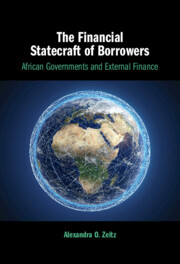Book contents
- Frontmatter
- Dedication
- Contents
- Figures
- Tables
- Acknowledgments
- 1 Introduction
- 2 Theory: The Financial Statecraft of Borrowers
- 3 The Big Picture: Large-n Evidence
- 4 Probing the Financial Statecraft of Borrowers through Comparative Cases
- 5 Ethiopia: Successful Financial Statecraft
- 6 Kenya: Uneven Financial Statecraft
- 7 Ghana: Limited Financial Statecraft
- 8 Conclusion
- Appendices
- References
- Index
1 - Introduction
Published online by Cambridge University Press: 12 December 2024
- Frontmatter
- Dedication
- Contents
- Figures
- Tables
- Acknowledgments
- 1 Introduction
- 2 Theory: The Financial Statecraft of Borrowers
- 3 The Big Picture: Large-n Evidence
- 4 Probing the Financial Statecraft of Borrowers through Comparative Cases
- 5 Ethiopia: Successful Financial Statecraft
- 6 Kenya: Uneven Financial Statecraft
- 7 Ghana: Limited Financial Statecraft
- 8 Conclusion
- Appendices
- References
- Index
Summary
The introduction previews the argument that developing countries can use borrowing relationships to their advantage. It situates this argument about the financial statecraft of borrowers within the literature on sovereign debt, foreign aid, and African politics. It explains the specific focus on sub-Saharan Africa by outlining three dynamics that enabled African governments to diversify their portfolios of external finance in the early twenty-first century: debt relief, Chinese lending, and liquidity in international bond markets. The chapter describes the book's mixed-methods research design, combining statistical analysis of the terms of aid agreements with three case studies of Ethiopia, Kenya, and Ghana. Finally, the chapter highlights how the financial statecraft of borrowers contributes to debates on financial interdependence, multipolarity, and the agency of developing countries.
Keywords
- Type
- Chapter
- Information
- The Financial Statecraft of BorrowersAfrican Governments and External Finance, pp. 1 - 30Publisher: Cambridge University PressPrint publication year: 2024

